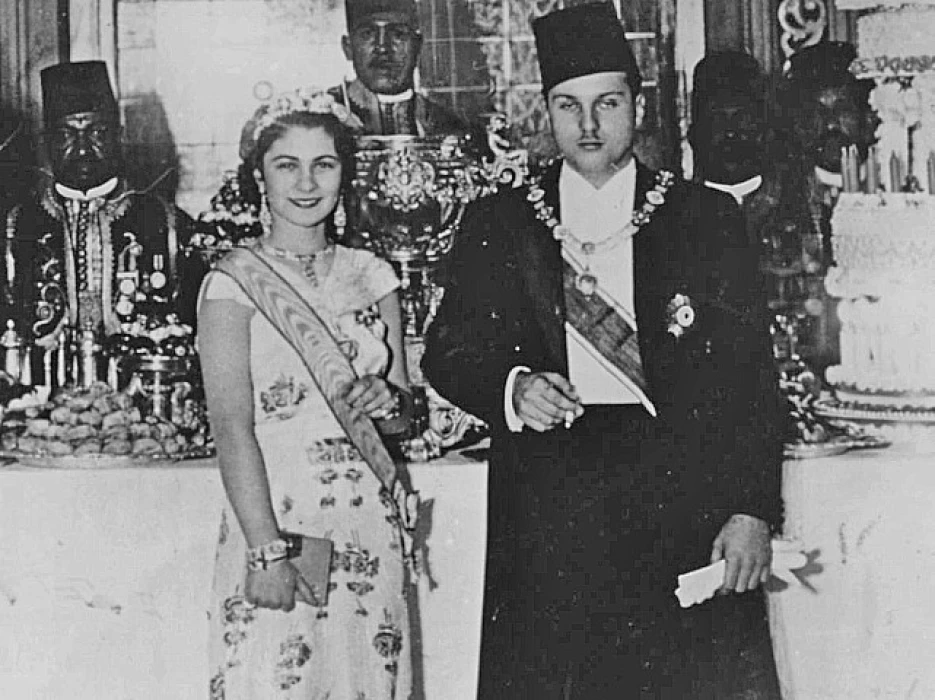
King Farouk of Egypt
King Farouk of Egypt
In 1936, Prince Farouk returned to Egypt from Britain to succeed his father Fouad I as King of Egypt and the eleventh ruler of the Muhammad Ali dynasty. His reign came to an end after 16 years following the army movement of 23 July 1952, which forced him to abdicate to his infant son Ahmed Fuad, who was 6 months old, and the curtain came down about a year later on the monarchy after the announcement of the establishment of the republican system in Egypt on 18 June 1952.
King Fuad I's son and heir, Farouk, received his education in Egypt and England. After the death of his father, King Fuad I, in late April 1936, the prince returned to Egypt on 6 May, barely 16 years old, which was the official date of his accession to the throne. After becoming king, he continued his father's rivalry with the popular Wafd Party and clashed with it on many issues, according to the British Encyclopaedia.
The young King Farouk I immediately clashed with Nahhas Pasha, the Wafd leader and prime minister, on several issues, including limiting the king's powers and international policies. The Islamist movement occupied a place within the palace during the reign of King Farouk, who used it to gain popularity on the street to overcome the rivalry of politicians, most notably the Wafd Party.
A Muslim-themed ceremony was organised for Farouk at the Rifai Mosque. Prince Muhammad Ali, the regent, had suggested that Sheikh al-Maraghi, then the Grand Sheikh of Al-Azhar, should lead the audience and present Farouk with the sword of his grandfather Muhammad Ali Pasha, but the Wafd Party, led by its leader Mustafa al-Nahhas, insisted that the young king be crowned in accordance with the constitution and did not organise the ceremony.
On July 23, 1952, an army coup compelled King Farouk to cede the throne to his six-month-old son, Ahmed Fuad, after sixteen years of rule. King Farouk departed Egypt the following day, July 26, 1952, in his magnificent yacht, Al Mahrousa, which had originally belonged to his ousted grandfather, Khedive Ismail.
Achievements of the Farouk Era
In 1936, King Farouk expelled all English workers in the palace service, leaving only the first pharmacist and the nannies of his sisters' princesses. He requested the government to cancel the privileges the British ambassador was receiving, such as a special guard from the English army, opening the royal door at the railway station, allocating a special train, and having a special reception for him. These privileges were enjoyed by the British High Commissioner before the 1936 Treaty, but the Wafd government maintained them. This decision marked a significant shift in the royal family's relationship.
In 1937, King Farouk donated EGP 4,325 to the poor and charities in Cairo and Alexandria through various societies. He also donated from his own funds to the poor and financed the recruitment of Arab and African students to study at Al-Azhar. His donations during visits to mosques and factories are inexhaustible due to their abundance.
The establishment of the Ministry of Social Affairs, whose first minister was Abdel Salam Shazly Pasha, a commendable trend for the government to take care of social affairs and establish a ministry from a society that has long been described as a half-percent society.
Establishment of the Journalists' Syndicate (Cabinet approval on 7 November 1939; the syndicate was established in 1941). The Marabit Army, a paramilitary force to assist the army in the defence of the country in case of danger. The Tax Law on Commercial and Industrial Profits was issued.














